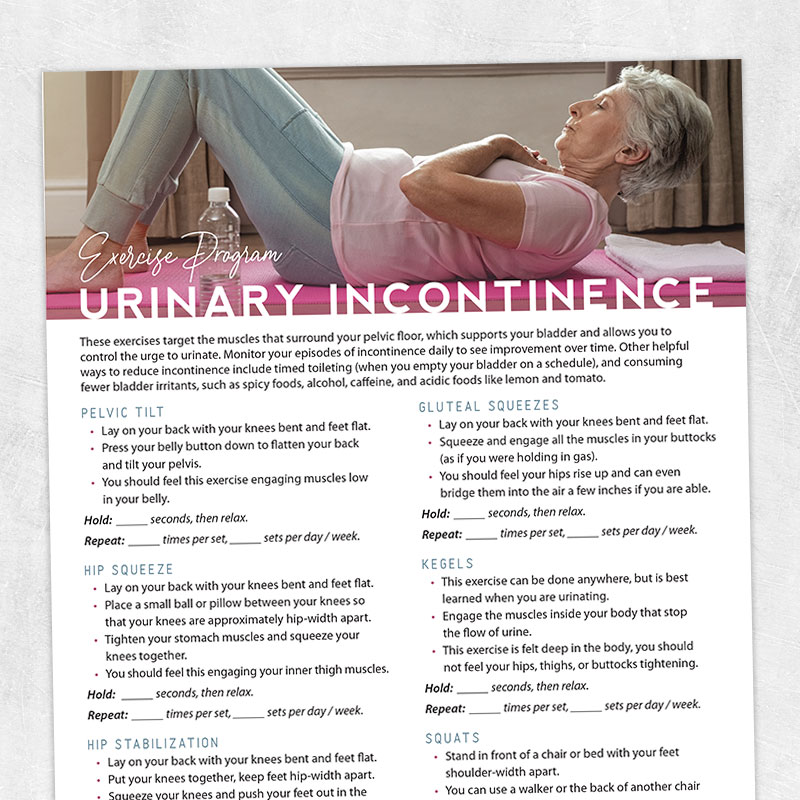
September 6, 2024
Urine Incontinence A Summary


Monitoring Of Urinary Incontinence In Postmenopausal Ladies: An Emas Medical Overview [23] is labelled the relationship between menopause and urinary system incontinence that women with urinary incontinence than those that did not have, considerably had greater BMI [24] Healthcare professionals must consider urinary incontinence a medical priority and develop ideal analysis abilities. They ought to be able to recognize and manage any kind of pertinent modifiable factors that might ease the problem.
Therapy
Why do I leak urine after my duration?
- Hormonal agents affect hair's all-natural cycle and structure.Skin problems.Sex-related symptoms.Weight changes.Mood and sleep issues.Digestive distress. Hormonal agent control or birth control medication.Hormone substitute medications.Anti-androgen medications.Vaginal estrogen.Clomiphene and letrozole.Assisted reproductive
- technology.Metformin.Levothyroxine. Antidiuretic hormonal agent('ADH)is a chemical generated in the mind that causes the kidneys to release less water, decreasing the quantity of urine generated. A high ADH degree creates the body to generate much less urine.
Alternate Treatments And Monitoring
Your bladder is like a storage tank-- as soon as the bladder is full, the brain sends a signal that it's time to urinate. Urine after that leaves the bladder when a muscular tissue opens up (sphincter), enabling the urine to move openly out of the body with the urethra. It is essential to determine the type of urinary system incontinence that you have, and your signs and symptoms commonly inform your physician which kind you have. If guided to pursue surgical procedure by your medical professional, punctual action is suggested, as waiting might minimize the efficacy of surgical therapy. The point of views revealed in patient reviews are by people only; they are not qualified medical professionals. These opinions should not be relied upon as, or instead of, the medical recommendations of a certified medical professional, etc. Urinary urinary incontinence is a widespread condition impacting numerous people, specifically postmenopausal ladies. Urethral incompetence usually causes recurring urinary system incontinence, usually at remainder. Hormone therapy (estrogen) in postmenopausal ladies relieves urinary regularity which brings about raise in the strength of muscle mass around the bladder. Althoughbasic science in this area is limited, a current placebo-controlled, randomizedclinical test of estrogen alone clarifies this issue. Urethral closureis depending on the incorporated action of the suburethral genital wall surface, thepubourethral tendons, the pubococcygeus muscles, and the paraurethral connectivetissues. As you age, the muscles that support your pelvic organs can https://075ixjw8vbirserw.s3.us-east.cloud-object-storage.appdomain.cloud/Pelvic-floor/treatment/urinary850450.html weaken. This implies that your bladder and urethra have less support-- typically causing pee leakage. Paraplegia or quadriplegia can develop within hours or days after the initial neurologic deficiency shows up. Laxity of the pubourethral tendons (ie, former zone of damage), mid vaginal area (ie, middle area), and uterosacral ligaments (ie, posterior area) make the usual tridirectional support of the vagina inefficient. Hemorrhage, infarction, or vascular concession to specific locations of the mind can result in lower urinary system system disorder. The frontal lobe, inner capsule, brainstem, and brain generally are entailed sites. Initially, urinary retention due to detrusor areflexia is observed. In mixed incontinence, the bladder outlet is weak and the detrusor is over active.- Whenever intra-abdominal pressure surpasses proximal urethral stress, spontaneous pee loss ensues.
- Individuals are frequently asked to maintain a diary for a day or more, up to a week, to tape-record the pattern of invalidating, keeping in mind times and the amounts of urine created.
- However, they can also go down during other phases of life, such as after delivering or while breastfeeding.
- It does not appear that the initial reason of dystrophy or cancer of outside genitalia is estrogen deprival.
Social Links